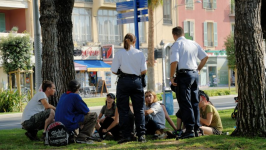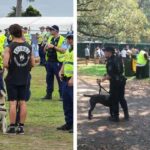Class Action Commenced Against Police Over Illegal Strip Searches

As festival goers battled through the mud, cold and rain on the New South Wales north coast this past weekend to see their favourite bands play at the Splendour in the Grass music Festival, news surfaced that a class action has been launched in the New South Wales Supreme Court. against illegal strip searches by police at last year’s events.
The significant number of young people to come forward about their treatment by police at last year’s Splendour festival, as well as other festivals around the state over the years, has been a matter of concern, alarm, frustration and disgust – with calls for action, accountability and reform.
The reports, some by teens as young as 15 years old, triggered an inquiry by the Law Enforcement Conduction Commission (LECC) – the police oversight body in New South Wales.
Illegal strip searches carried out
The LECC inquiry was established in 2019, but was shut down by the Berejiklian Government in 2020.
It investigated several police strip searches of young people and found that many of them contravened the provisions of the Law Enforcement (Powers and Responsibilities) Act 2002 (‘the LEPRA’), which prescribes strict rules and regulations regarding when a strip search is considered to be permissible.
One New South Wales police officer who conducted 19 strip searches on attendees at Splendour in the Grass admitted to the inquiry that all of the searches he performed could be considered illegal.
He specifically admitted that the requirement of “seriousness and urgency” prescribed by section 31 of the LEPRALaw Enforcement did not apply to the circumstances in which he saw fit to conduct the searches.
The inquiry also heard that while police officers are supposed to keep records of all strip-searches and the reasons they are undertaken, records are not routinely checked let alone audited.
The LECC made a number of recommendations for reform, as did the 2019 Coronial Inquiry into drug-related deaths at music festivals along.
Recommendations ignored
And while the police have ignored those recommendations, festival organisers at this year’s Splendour took it upon themselves to introduce a number of changes in line with the inquiry’s calls, including that attendees younger than 18 years old be accompanied by an adult.
While organisers say rule is to ensure against alcohol consumption, many believe the real reason is to reduce the strip searching of children and/ or to ensure kids are only strip searched if they are in the presence of a parent or guardian.
No political will to stop strip searching teens
And while the illegal strip searching of kids has been found time and against to be ‘a routine’ part of policing which some have labelled state-sanctioned sexual assault, there seems to be very little political will to stop the degrading, humiliating and potentially scarring practice
One young woman told the NSW Coronial Inquest into drug-related deaths at music festivals that a police officer threatened to make a strip search “nice and slow”, unless she confessed to where her drugs were hidden.
Similarly, a young man who carries an insulin pen for diabetes was strip searched after a positive indication of drugs by a sniffer dog – he was asked by officers to leave his shirt on but to remove his pants and underwear and bend over.
The use of sniffer dogs – ineffective, intrusive and dangerous
For many years, there have been assertions that the police use of sniffer dogs is not only ineffective and intrusive, but potentially dangerous as it leads to young people ‘loading up’ – having a significant amount of drugs at one time before arriving at festivals, potentially leading to overdose.
In terms of effectiveness, a report prepared by the New South Wales Ombudsman has found that almost every positive indication by a sniffer dog resulted in a member of the public being searched. But approximately 75% of those searched were not found to be in possession of illicit drugs, indicating that the accuracy of sniffer dogs is only around 25%.
And it should be borne in mind that this is in environments such as festivals where anecdotal reports suggest many are in possession of drugs, and that searching any four people randomly could produce the same results.
Recorded on police database, despite doing nothing illegal
Last year, data obtained by the Redfern Legal Centre showed that between 2018 and 2020, more than 5,500 people had their details recorded in the central police intelligence database following a strip search, despite nothing illegal being found.
Because the LECC does not have the power to discipline let alone prosecute police officers – only to make recommendations to the Department of Public Prosecutions (DPP) if it believes laws have been broken – those young people who have been strip searched at music festivals across the state dating back to 2015 have now filed proceedings in the Supreme Court of New South Wales claiming that police officers carried out “unlawful acts including assault, battery and false imprisonment” against festival goers, whilst searching them for illicit substances.
Supreme Court Class Action
According to a joint statement from legal representatives of the plaintiffs, “group members also allege that some people who were searched – including minors – were directed by police to lift or remove items of clothing, lift their breasts and genitals, or strip naked and squat and cough so officers could visually inspect body cavities. Women were ordered to remove sanitary products so they too could be inspected”.
The strip searches that group members were subjected to, the Statement of Claim notes, were allegedly “conducted in contravention of the Law Enforcement (Powers and Responsibilities) Act 2002 (NSW)”.
While the young people hope to be compensated for their ordeal, the class action also signals impetus for change. While the NSW Police force has over time mooted policy changes and internal education programmes, most people believe that strip searching is a very harmful police practice and should only be used in the most necessary cases and certainly not on young people.
The other problem is that for a young person confronted by armed officers ordering them to remove their clothing would be a difficult request to refuse, and a refusal can possibly be taken as a signal of having something to hide.
And yet, when young people consent to a strip search it does have consequences because if the search is subsequently found to have been conducted illegally, having given consent overrides that finding and makes the strip search legal.







